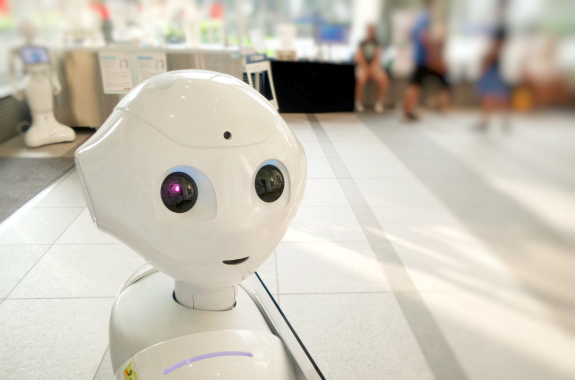5 Artificial Intelligence-AI’s Jaw-Dropping Benefits in Healthcare
Have you ever watched Ex-Machina?
Or I, Robot?
Or the more common one – The Terminator?
If you had watched all the above movies then you’re thinking what I’m thinking, this article is going to be about artificial intelligence.
But we are not going to discuss the possibility of an AI robot’s invasion or whether they will take over the world.
Instead, we are going to uncover some of the fascinating applications of artificial intelligence in the healthcare industry.
It is undeniable that artificial intelligence shows tremendous potential in various industries. As a result, thousands of governments, tech companies, and healthcare providers invest millions of dollars in testing and integrating AI-driven solutions.
So, how is it utilized in hospital ground?
AI Transform Diagnosing Method
One quick fact!
Photo produced by smartphone is becoming more advanced in term of quality, and the majority of people owns a device have not shown any sign of slowing down.
So, what is the relationship between AI software and smartphone?
Specifically, for dermatologists and ophthalmologists, artificial intelligence software can support detecting diseases by analyzing images from the user. Having an abundant pool of image data which clearly shows eye’s color, skin complexion, pimples, wounds, and other variables can severely reduce the diagnosing time for physicians. According to a UK’s group of researchers, they have developed a tool whose algorithm can detect even the most potentially harm indicating any hidden disease just by analyzing images.

Clinical decision support tool like AI is far from perfection and completion. But when a healthcare provider shows you statistic which gives you a fair warning for critical conditions you may encounter based on your medical record, you would have to pay close attention to their word at least. Such chronic conditions include seizure, stroke, cancer, etc. should support clinicians to make a better decision on an appropriate healthcare treatment toward a patient. And all of those warnings come from the AI’s ability to analyze a patient’s set of historical data that drastically complicated.
Surgery
Every surgery contains a certain amount of risk.
Doctor’s job is to reduce that probability to the lowest number as much as he/she could.
If performing surgery is too much for a body to handle, many doctors and physicians would typically suggest the most minimally invasive procedures for their patients. And here is where artificial intelligence plays an essential role in medical aid.
Robot equipped with AI software has been used in surgery, and it does show potential outcomes for both patients and doctors.
AI-assisted software shall run a full pre-op scan of the patient’s medical record by analyzing tons of data and integrating machine learning techniques to unveil the most in-depth insight. Therefore, during the procedure, AI uses that analytics to guide doctor the best practices which suit the patient’s condition most. As a result, this application of artificial intelligence software can contribute to lowering the number of complications as well as surgeon variations.

A statistics involving 379 orthopedic patients shows that with the assistant of AI during surgery, the number of complications is five times less than the procedure done by the surgeon who goes solo. The benefit’s list even goes on. With the integration of artificial intelligence in healthcare, the patient’s hospital stay is reported to have a reduction of 21% shorter post-op.
More than that, a complex surgery can usually take quite a lot of hours, a surgeon may or may not well-aware ALL movements in the entire operation.
That’s why AI software is here to save the day. It can provide real-time data and deliver analytics to aid surgeon make the right call for patients. Hence, the percentage of risk shall reduce and healthcare quality is enhanced through AI’s ‘magical’ ability.
Radiology Tools
According to the World Medical Innovation Forum in Boston, USA, as artificial intelligence gets its feet in healthcare, it shall make a high-tech change in radiology.
As you read along the article, many hospitals still apply diagnostic process based on physical tissues which are extracted from the human body. Going through the biopsy procedure to diagnose sickness may contain a certain amount of risks as it may cause infection to the patient.
That’s why artificial intelligence is promised to make radiology become a tissue-free tool. For example, AI can show physicians how cancer’s tumor develop and progress as a whole in the body. Hence, healthcare specialist may identify how aggressive it is and provide an appropriate amount of chemo aligning with the body’s capabilities.
But that’s not all.

The application of using artificial intelligence in clinical diagnosis could be one essential benefit in rural areas or developing nations. Particularly, AI imaging technology can aid those countries who in need of skilled radiologists without having the actual personnel on site.
Virtual Nursing
We have mainly discussed the doctor’s side so far.
Now, let’s take a look at the other side of the coin.

Short supply of skilled human resources is still a burning issue for most hospitals and nurse is one of them. Artificial intelligence could be applied to bring much more ease to hospitals. Notably, something called virtual nursing.
Virtual nursing almost represents on hospital ground all day and night which deliver significant benefits for lots of stakeholders. The AI-driven assistant learns from electronic health record as known as EHR of various patients, and then, it shall establish the most personalized relationship as it could be to deliver dedicated care for patients. In specific, it shall learn when would be the most suitable time a patient to take medications. It will also learn how to answer frequently asked questions, monitor patients’ status post-op. And all these loving care are delivered through a tablet or a fixed TV set in each patient’s room.
Are you not buying what you’ve just read?
Well, let’s consider these statistics.
According to the Accenture consulting firm, the artificial intelligence-powered virtual nursing assistant could save $20 billion per year by 2026 in the healthcare industry. Also, a study stated that many patients rather receive discharge instructions from a virtual nurse than a regular employee and the number is around 75% of the respondents.
Paper Work…lots of Paper Work!
The day you walk into a hospital and receive instruction to fill out a health check request form is no longer exist any more thanks to the integration of artificial intelligence in healthcare.

Electronic health record and electronic medical record have saved quite an amount of time for many hospitals allowing doctors and nurses to concentrate on delivering better healthcare service. But with artificial intelligence along the way, the situation could even experience a more positive change. Doctors will no longer have to manually type entries to order a test, prescribe medications and write chart notes thanks to voice-to-text transcription technology.
And hear this!
As a result of the integration, it could save $18 billion in healthcare industry as high-tech devices support doctor on paper tasks
Related post: How Healthcare Innovations Adapt to Senior Patients?









